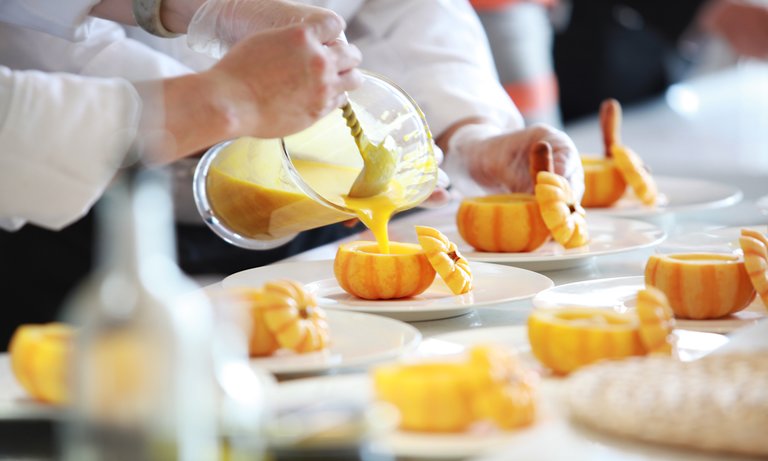
Britain is a nation of food-lovers, and so it should probably be unsurprising that so many people aspire to work as chefs. It’s an opportunity to create amazing dishes that will make people happy, to push an artform, and to express a love of food.
What is it like to work as a chef?
Working as a chef can be extremely demanding in short stretches. You might find that there several different demands on your attention arriving at once, and thus you’ll need to be good at managing your own workload. You’ll also need to be able to communicate with other people in the kitchen, and work as a team. While some people are better at these things than others, it’s also fair to say that you’ll pick them up as you go along.
Much of your time will be occupied in preparatory cooking – that is, peeling vegetables and removing bones from meat and fish. In a commercial environment, this is done in advance, so that when the orders arrive, you don’t have to waste time washing carrots.
There’s also a lot of management to worry about. You’ll need to monitor stock levels, maintain a clean and hygienic workspace, and manage the chefs under you. You’ll also need to think about equipment, and ensuring that kitchen staff have access to high-quality cookware.
What are the different kinds of chef?
You might encounter a few different terms for roles in the kitchen. Let’s define some of them.
A Head Chef, or Chef de Cuisine, is the person in charge in the kitchen, who creates and implements the menu. Second in command in the sous chef, whose role is to make sure that everything in the kitchen works as it should. A Chef de Partie is in charge of a particular category of food, while a commis is at the bottom of the hierarchy, having usually just completed their training.
What do I need to become a chef?
You don’t need any formal qualifications to become a chef. You can simply work your way up, in the classic sense. Many of the famous chefs you might recognise from the television got their start when they were in their teens, perhaps working as pot-washers before progressing to waiting tables and finally into the actual preparation of food. The advantage of this approach is that you get used to the restaurant environment early on, and there’s no culture shock as you make the move upwards.
With all of that said, there are courses and apprentice programs that might it easier to actually learn to cook. Of these, the most popular is the City & Guilds Professional Chef Diploma, which is like an NVQ which will last for three years. The advantage of formal training like this is that it will provide you with a complete skillset: you’ll be able to cook everything from pastry to scallops to nougat by the end of it.





